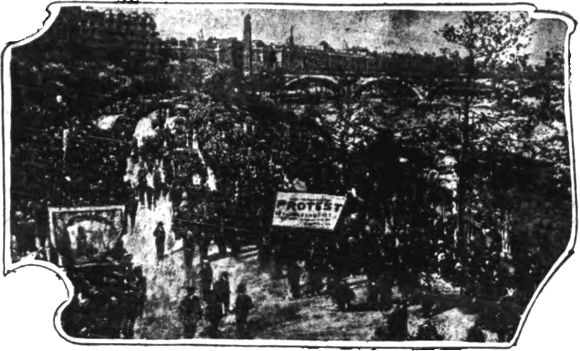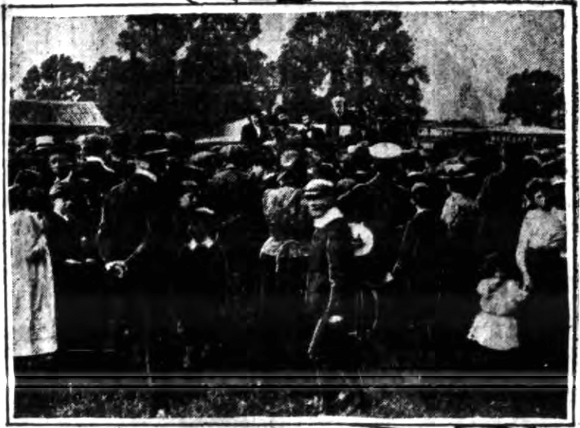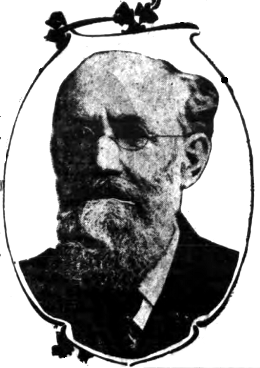Here are a couple of archival bits concerning the tax resistance campaign against taxpayer-funded sectarian education in Britain.
First, from the Spectator (excerpts):
The Educational Imbroglio.
To those who, like ourselves, are full of sympathy and admiration for the
Nonconformists, and who believe that the English people owe them a deep debt
of gratitude for maintaining a high and noble standard of action not only in
things spiritual but in things political, the attitude of paradoxical
violence that they have adopted over recent educational developments is a
cause of deep regret. To speak plainly, it is pitiable to see good and
self-respecting men so far carried away by rhetorical clap-trap as to imagine
that they are compelled by conscience not to pay rates for the same objects
for which they were quite willing to pay taxes. We admire intensely men who
will sacrifice everything for conscience’ sake. It is to such men that
England owes her greatness. But the more we admire that steadfastness and
independence in our past history the more we must dislike to see it parodied
and made ridiculous by the followers of
Dr. [John] Clifford. If such
enactments as the present Bill are to produce resistance to the law, and if
the spirit which inspired [John] Hampden’s resistance to ship-money is to be
invoked every time that the majority decides against a minority on a question
of educational administration, what would be left for us to do if real
oppression were to take place? Consider for a moment what has happened. Up
till now the Nonconformists have been regularly paying taxes which in part
have gone to schools in which religious doctrines disliked by Nonconformists
have been taught. They have never thought of going to prison in order to
resist those taxes. Now, however, they tell us that it is a matter of
conscience to them to break the law and not pay rates part of which will go
to schools in which religious doctrines which they dislike are being taught.
There is no attempt to prove that the new Act has in any way altered the
situation for the worse as regards the Nonconformists. On the contrary, it
has to be admitted by all sincere persons that the new Act changes the
situation for the better, not for the worse, as far as the Nonconformists are
concerned. Their conscientious scruples, that is, are less, not more,
infringed upon by the new Education Act than by the old. The only difference
is between rates and taxes. The Nonconformist who means to resist with Dr.
Clifford cannot avoid being the sport of a paradox. He must argue that it is
perfectly right to pay taxes which help to teach a religion not his own, but
so wrong to pay rates for that purpose that he will resist the law rather
than do so.
Next, from the New York Press of , a much more flattering portrait (excerpts):
Fighting Again the Fight the Pilgrim Fathers Fought

Parade of the Passive Resisters up the Thames Embankment in London
There are now 70,000 Passive Resisters, and so far 7,100 of them have been summoned to court to show cause why their goods should not be sold for taxes in support of a religious creed in which they do not believe, and some 350 of such sales have been held. Each sale breeds new “Resisters,” and the movement has been growing steadily ever since it was begun, , under the leadership of the Rev. Dr. John Clifford, former president of the National Council of Free Evangelical Churches, pastor of the Westbourne Park Church in London, and probably the foremost Baptist in England.
Suppose a large population of the day schools of the United States were supported and managed by one religious denomination, with teachers of that denomination and with instruction of all the pupils in that one creed. Then suppose the government enacted a measure taking over those schools and — without changing the sectarian religious instruction o[r] the requirement that the principal teachers should be of the one denomination — should call upon the general taxpayer to support those schools. Wouldn’t there be a beautiful row before many hours had passed? Wouldn’t the taxpayers of every other faith except the favored one rise to a man and tell the Government what they thought about it, in terms that couldn’t be mistaken?
Well, they move more slowly over here, and the favored church is, of course, the Established Church, to which, nominally, half the people in England belong. Yet the American parallel will serve to give an idea of what a big, significant and deep-seated conflict is now going on in this country, despite the fact that outsiders hear little of it.
What in the United States is called the Episcopal Church is in England the Established Church, and all the others — Methodist, Baptist, Presbyterian, what you will — are bunched together in the Episcopal mind under the sweeping title of “Nonconformists” or “Dissenters.” They are looked upon with some condescension socially and theologically. Only the other day a clergyman, touching from his pulpit on the present controversy, said magnanimously that he hoped — yes, he hoped — that Nonconformists would not be excluded from heaven!
They form the great body of the solid, obstinate, hardworking, law-abiding “middle class,” as it is called on this side of the ocean. What might be dubbed their cathedral is the famous City Temple, from whose pulpit Dr. Joseph Parker thundered for so many years, and which of late has been the scene of several excited gatherings addressed by such noted pulpit orators as the Rev. F.B. Meyer, the Rev. R.J. Campbell, who succeeded Dr. Parker; Dr. Clifford and other leading Nonconformists, all arrayed against the Government. Some of them were doubtful about Dr. Clifford’s scheme of refusing to pay taxes to the enemy, but all were united in saying that the Government must either repeal the hated Education bill or be overthrown. The great Liberal party of Gladstone, disunited over the Boer War, came together again in fighting the Government on this act, and now hopes to get back into power as much because of the Education bill as because of Chamberlain’s tariff scheme.
The size of the struggle becomes apparent when one realizes that half the churchgoers in England are arrayed against the other half. A careful census conducted by a London daily newspaper shows that in actual worshipers the Anglican Church in London does not outnumber the Nonconformists, while in the country districts the Established Church falls short of the Dissenters. Estimating the respective strengths according to the numbers of communicants, both in London and the provinces, the Nonconformists are outnumbered. The latter, however, are not disturbed at this, for they declare that every man who is nothing claims the Anglican Church, and they say, as well, that the figures include the “twicers” — that is, those who attend two services each Sunday.
Most of the Nonconformists decided at first to pay the hated tax and take it out in voting against the Government when they got the chance, but the “martyrdom” of the 7,000 who have been warned that they are to be sold up, and the steadfastness of the 70,000 who intend to be sold up, bring on converts to such an extent that no one can tell where the affair will end.
“It is my opinion,” said Dr. Clifford to the writer [Curtis Brown], “that nothing but a general election, bringing a change of Government, will stop this fight. As long as the Tory party remains in power we have little chance of getting anything permanent, but the Liberal leaders have pledged themselves to two things, which, if granted, will probably suspend the campaign for a time. These are popular control over the support of the public schools and the abolition of sectarian tests for teachers. Until these, at least, are granted, the Passive Resisters movement will continue to grow — how much I do not pretend to predict.”
Although almost nothing has been written in the United States about this big contest, letters from sympathizers across the ocean are beginning to pour in by every mail. In New York and Boston committees have been formed, and funds are being solicited to send across the ocean. The Rev. Dr. Hill of Valley Falls, N.Y., is the head of the American movement, and nearly all the contributions reach England through him. Drs. Lorimer and Haw of New York are associated with Dr. Hill, while the Rev. Dr. McArthur of Boston is furthering the cause in that city.
For the benefit of American readers Dr. Clifford summed up the Passive Resistance creed in these words: “We contend that no taxpayer should be obliged to support schools in which dogmatic and ecclesiastical instruction contrary to his belief is taught, nor to help pay teachers who must undergo a denominational religious test before they are allowed to practice their profession. It is precisely the same spirit which caused the Pilgrims to emigrate to America in , for just as the Government was trying to force a state religion upon the people then, so it is trying to strengthen that religion now by proselytizing the children of Nonconformist parents.”
One of the most unconventional of the auction sales was held recently in a suburb of Birmingham. A Nonconformist minister who had refused to pay that portion of his taxes which was to be devoted to the support of schools of another faith surprised the officers who visited him to seize his goods by inviting them into his little front parlor, summoning his family and reading the Psalm in which appears the words: “Surely, He shall deliver them from the snare of the fowler and from the noisome pestilence,” and then, asking officers and all to kneel in prayer, in the course of which the pastor besought special grace for the dear friends who had called upon him that afternoon. After this ceremony the “dear friends” carted off the pastor’s piano.
At Sutton some of the goods of a minister 90 years old were sold off, and in Berwick a Methodist minister was sentenced to seven days’ imprisonment for “passive resistance.” At Fulham the Mayor himself was among the number summoned to court for withholding the educational part of his tax. He told the Magistrate that he felt his position keenly, but, come what might, his conscience would not let him pay any portion of a tax for sectarian teaching.
Near Bristol a woman who owned a little farm, and who had tendered all of her tax except the two dollars which was to be devoted to the local sectarian school, was told that part payment could not be accepted, and the horse and cart on which she was depending for a living were seized for the payment of the whole sum. Friends finally bought in the property for her, but the Government had the last word by charging for a week’s board for the horse.
In another place some vases for which the “resisters” had paid $50 were knocked down to a stranger for the $2.50 of taxes which had been withheld. In most cases, however, the goods have been bought in by friends of the “resisters” and returned to the original owner, who would thereafter find some way of recouping his rescuers without damage to his conscience. At one sale in fashionable Brighton the auctioneer was so much in sympathy with his victims that he refused to accept any fee, and sold the goods to friends of the owners for the precise sum required to satisfy the warrant. Strangers present on the lookout for bargains found it impossible to make themselves heard when they offered more than the friendly bidders. That auctioneer became a local hero, and was the chief guest after the sale at a meeting in which the local parson proposed to the crowd to send him to Westminster to see what price he could get for a damaged Tory Cabinet.
Eighty would-be martyrs at Ipswich were highly disgusted on the morning of the intended sale of their goods to find that some anonymous benefactor had paid their taxes for them the night before. A meeting was actually held afterward, at which some of the would-be “resisters” protested against the action of the “ill-disposed” unknown person.
At Northwood the refused tax for six persons made a total of $14, and the goods sold to meet this tax were bought in, as usual, by friends. But a heavy police guard had been necessary to protect the auctioneer, and the fees of the police and the auctioneer and other expenses made a total of nearly $100. All of the persons concerted were so poor that they could not meet this additional sum, and in consequence a further sale was held, in which the six “resisters” were well-nigh cleaned out.
An officer who called to seize the goods of a “resister” at Stoke-on-Trent was confronted at the door by a hearse, in which the coffin of the “resister’s” son was being placed. The house was barred to the officer, so he went around to the stable and seized the saddle which had belonged to the dead boy.
Although, as a rule, the local Nonconformist ministers have attended the sales and have exerted themselves to the utmost to keep the sympathizers from doing anything more than chaff the man whose unpleasant duty it was to sell the goods, yet some of the auctioneers have been pretty badly mauled, and one or two have had to run for their lives without effecting sales. One of them was saved from unpleasant experiences by a Methodist preacher, who laid down on the floor above the room in which the sale was being held and quieted the crowd by an address through a trap door.
Some of the local magistrates before whom the “resisters” have to appear in response to summonses let themselves be fairly submerged by the floods of oratory that break loose on such occasions, but one of the, W.S. Gilbert — none other than the librettist of Gilbert and Sullivan fame — distinguished himself by cutting short the oration of the first “resister” who came before him. “This court shall not be made an arena for declaiming against an act of Parliament,” quoth the author of “Pinafore.”
The “resisters” have a powerful voice in the House of Commons with the brilliant young Lloyd-George as the leader, and they have a big representative in the financial world in R.W. Perks, who is the English adviser and backer of C.T. Yerkes in the underground railroad schemes. They have also established a weekly newspaper, The Crusader, and appear to be gaining steadily in confidence that sooner or later they will turn Arthur Balfour and his Cabinet out of office.

Open-Air Auction of Passive Resisters’ Goods. Dr. Clifford Addressing the Crowd from the Auctioneer’s Stand

